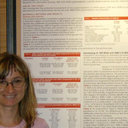In vivo effect of alpha-bisabolol, a nontoxic sesquiterpene alcohol, on the induction of spontaneous mammary tumors in HER-2/neu transgenic mice.
الكلمات الدالة
نبذة مختصرة
Breast cancer represents the most commonly diagnosed invasive malignancy in pre- and postmenopausal women in both developed and underdeveloped countries. Taking into account that treatment options, including surgery, have not been able to deal with the growing incidence of breast malignancy, it is required to develop mechanism-based novel agents for its prevention. Wide interest in some natural compounds as antiinflammatory agents and as alternative to the traditional medicines is increasing because they do not provoke any adverse effects and are effective in multiple organs, alpha-Bisabolol (BISA), a small oily sesquiterpene alcohol, was reported as chemopreventive agent in induced rat mammary carcinogenesis. The aim of the present study is to investigate the role played by two doses of BISA (via intramammary infusion) on the induction and development of mammary tumor in HER-2/neu transgenic mice as well as the BISA effect after tumor surgical resection. The main data show that (a) optimal dosage of BISA is 10 mg/mouse rather than 3.6 mg/mouse with no adverse effects (e.g., alopecia); (b) the number of the palpable tumor masses decreases in mice treated with 10 mg/mouse of BISA; (c) mice after surgical resection of the primary tumor and treatment with BISA (10 mg) are free from tumor for more weeks, after the surgical treatment; (d) using array analysis, some genes implicated in carcinogenesis mechanisms (NF-kappaBia, Map2k, Mapkl4, and HER2/ neu), angiogenesis process (Fgf), and inhibition of apoptosis (Birc5) are differently regulated after BISA treatment, with a downregulation of the HER2/neu as well as of Fgf and Birc5 genes; (e) the NK cell cytotoxicity increases in tumor-treated mice, especially after the removal of the first tumor mass. Such effectiveness could be important to achieve goals for a possible combination of BISA to conventional therapies in breast cancer and to tumor surgical removal (adjuvant therapy), as suggested for other sesquiterpene analogs.



